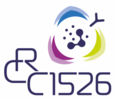Publication: How are auto-reactive T cells evading immune therapy?
The latest CRC 1526 publication by Saggau et al. adresses the question how auto-reactive T cells evade immune therapy:
In autoimmune diseases autoantigen-specific T cells orchestrate the pathogenic immune reaction against self. However, the phenotype and functional properties are poorly defined because autoantigen-specific T cells are difficult to track in humans. We show that these cells acquire an unexpected Foxp3+ “exhausted” T helper (ThEx) cell phenotype and shut down their activation program, due to chronic stimulation. Importantly this allows ThEx cells to escape current therapies that target activated T cells. In this way ThEx cells persist for many years and can be reactivated, providing an explanation how ThEx cells drive disease chronicity and contribute to disease flares. Targeting of ThEx cells may enable long-lasting and durable therapies of autoimmune diseases.







